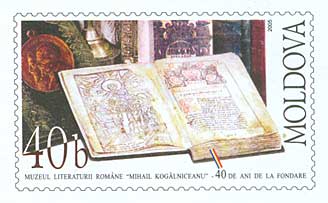|
N. Crevedia
Nicolae Crevedia (born Niculae Ion Cârstea; December 7, 1902 – November 5, 1978) was a Romanian journalist, poet and novelist, father of the writer-politician Eugen Barbu. Of Muntenian peasant roots, which shaped his commitment to agrarian and then far-right politics, as well as his dialectal poetry and humorous prose, he preferred bohemian life to an academic career. As a writer at ''Gândirea'', Crevedia became a follower of Nichifor Crainic, and worked with him on various other press venues, from ''Calendarul'' to '' Sfarmă-Piatră''. Turning to fascism, he sympathized with the Iron Guard, and, in the late 1930s, contributed to the press campaigns vilifying ideological enemies, while also putting out novels, reportage pieces, and anthologies. His affair with the Iron Guard muse Marta Rădulescu was at the center of a literary scandal, and was fictionalized by Crevedia in one of his novels. Fluent in Bulgarian, Crevedia became press attaché in the Kingdom of Bulgaria under ... [...More Info...] [...Related Items...] OR: [Wikipedia] [Google] [Baidu] |
:Template:Infobox Writer/doc
Infobox writer may be used to summarize information about a person who is a writer/author (includes screenwriters). If the writer-specific fields here are not needed, consider using the more general ; other infoboxes there can be found in :People and person infobox templates. This template may also be used as a module (or sub-template) of ; see WikiProject Infoboxes/embed for guidance on such usage. Syntax The infobox may be added by pasting the template as shown below into an article. All fields are optional. Any unused parameter names can be left blank or omitted. Parameters Please remove any parameters from an article's infobox that are unlikely to be used. All parameters are optional. Unless otherwise specified, if a parameter has multiple values, they should be comma-separated using the template: : which produces: : , language= If any of the individual values contain commas already, add to use semi-colons as separators: : which produces: : , ps ... [...More Info...] [...Related Items...] OR: [Wikipedia] [Google] [Baidu] |
Sfarmă-Piatră
(; literally "Stone-Crusher" or "Rock-Breaker", named after one of the ''Uriași'' characters in Romanian folklore) was an antisemitic daily, monthly and later weekly newspaper, published in Romania during the late 1930s and early 1940s. One in a series of publications founded by Nichifor Crainic (better known as the head of ''Gândirea'' magazine), with support from ''Universul'' editor-in-chief Stelian Popescu, it attempted to regroup the various fascist and pro-fascist movements around Crainic's " ethnocratic" principle. The editorial staff comprised a group of far right intellectuals; alongside the editor-in-chief Alexandru Gregorian, they included Ovidiu Papadima, Vintilă Horia, Dan Botta, Dragoș Protopopescu, Toma Vlădescu, and Pan M. Vizirescu. It notably hosted contributions by writers Ioan Alexandru Brătescu-Voinești, Radu Gyr and Ștefan Baciu. Noted for its contemptuous style of journalism and its recourse to violent language, ''Sfarmă-Piatră'' launche ... [...More Info...] [...Related Items...] OR: [Wikipedia] [Google] [Baidu] |
România Literară
''România Literară'' is a cultural and literary magazine from Romania. In its original edition, it was founded on 1 January 1855 by Vasile Alecsandri and published in Iași until 3 December 1855, when it was suppressed. The new series appeared on 10 October 1968 as a continuation of '' Gazeta Literară''. It is the Writers' Union of Romania's official magazine. The magazine is based in Bucharest and is published on a weekly basis. Editors-in-chief * Geo Dumitrescu (1968–1970) * Nicolae Breban (1970–1971) * George Ivașcu (1971–1988) * D. R. Popescu (1988–1989) * Nicolae Manolescu Nicolae Manolescu (; b. 27 November 1939, Râmnicu Vâlcea) is a Romanian literary critic. As an editor of '' România Literară'' literary magazine, he has reached a record in reviewing books for almost 30 years. Elected a corresponding member ... (1990–present). References External links Official website 1855 establishments in Europe 1855 establishments in the Ottoman Empire ... [...More Info...] [...Related Items...] OR: [Wikipedia] [Google] [Baidu] |
Giurgiu County
Giurgiu () is a county (''județ'') of Romania on the border with Bulgaria, in Muntenia, with the capital city at Giurgiu. Demographics In 2011, it had a population of 265,494 and the population density was . * Romanians – over 96% * Romani – 3.5% * Others – 0.5% Geography This county has a total area of . The county is situated on a plain – the Southern part of the Wallachian Plain. The landscape is flat, crossed by small rivers. The southern part is the valley of the Danube which forms the border with Bulgaria. In the North, the Argeș River and Dâmbovița River flow. Neighbours * Călărași County in the East. * Teleorman County in the West. * Ilfov County and Dâmbovița County in the North. * Bulgaria in the South – Ruse Province and Silistra Province. Economy The county has two big areas of development: one close to the city of Giurgiu – The Free Trade Zone Giurgiu, and one in the North of the county due to its proximity with Bucharest ... [...More Info...] [...Related Items...] OR: [Wikipedia] [Google] [Baidu] |
Romanian Literature
Romanian literature () is literature written by Romanian authors, although the term may also be used to refer to all literature written in the Romanian language. History The development of the Romanian literature took place in parallel with that of a rich Romanian folklore - lyric, epic, dramatic and didactic - which continued in modern times. The Romanian oral literature includes doine (lyric songs), ''balade'' (ballads), hore (dance songs), colinde (carols), ''basme'' ( fairy tales), ''snoave'' (anecdotes), ''vorbe'' (proverbs), and ''ghicitoare'' (riddles). Beginnings The earliest surviving document in Romanian is Neacșu's Letter written in 1521, to the ''jude'' ("judge and mayor") of Brașov, Hans Benkner. Romanian culture was heavily influenced by the Eastern Orthodox Church, the official stance of the Romanian Church being that Orthodoxy was brought to the Romanian land by the Apostle Andrew. According to some modern Romanian scholars, the idea of early Christianis ... [...More Info...] [...Related Items...] OR: [Wikipedia] [Google] [Baidu] |
Sergei Yesenin
Sergei Alexandrovich Yesenin ( rus, Сергей Александрович Есенин, p=sʲɪrˈɡʲej ɐlʲɪkˈsandrəvʲɪtɕ jɪˈsʲenʲɪn; ( 1895 – 28 December 1925), sometimes spelled as Esenin, was a Russian lyric poet. He is one of the most popular and well-known Russian poets of the 20th century, known for "his lyrical evocations of and nostalgia for the village life of his childhoodno idyll, presented in all its rawness, with an implied curse on urbanisation and industrialisation." Biography Early life Sergei Yesenin was born in Konstantinovo in Ryazan Governorate of the Russian Empire to a peasant family. His father was Alexander Nikitich Yesenin (1873–1931), his mother's name was Tatyana Fyodorovna (nee Titova, 1875–1955). [...More Info...] [...Related Items...] OR: [Wikipedia] [Google] [Baidu] |
Ion Minulescu
Ion Minulescu (; 6 January 1881 – 11 April 1944) was a Romanian avant-garde poet, novelist, short story writer, journalist, literary critic, and playwright. Often publishing his works under the pseudonyms I. M. Nirvan and Koh-i-Noor (the latter being derived from the famous diamond), he journeyed to Paris, where he was heavily influenced by the growing Symbolist movement and Parisian Bohemianism. A herald of Romania's own Symbolist movement, he had a major influence on local modernist literature, and was among the first local poets to use free verse. Biography Early life Born in Bucharest to the widow Alexandrina Ciucă (the daughter of a shoemaker in Slatina, she was 20 at the time),Matei Călinescu, p. V he was the posthumous child of Tudor Minulescu (a leather salesman who had died on New Year's Eve, probably as a result of a stroke). Originally, Minulescu was meant to be born in Slatina, but bad weather prevented his mother from leaving the capital city. Adopted by ... [...More Info...] [...Related Items...] OR: [Wikipedia] [Google] [Baidu] |
Tudor Arghezi
Tudor Arghezi (; 21 May 1880 – 14 July 1967) was a Romanian writer, best known for his unique contribution to poetry and children's literature. Born Ion N. Theodorescu in Bucharest, he explained that his pen name was related to ''Argesis'', the Latin name for the Argeș River. Biography Early life He graduated from Saint Sava High School in October 1896, started working to pay for his studies, and made his debut in 1896, publishing verses in Alexandru Macedonski's magazine ''Liga Ortodoxă'' under the name ''Ion Theo''. Soon after, Macedonski, the herald of Romanian Symbolism, publicized his praise for the young poet: "This young man, at an age when I was still prattling verses, with an audacity that knows no boundaries, but not yet crowned by the most glittering success, parts with the entire old versification technique, with all banalities in images in ideas that have for long been judged, here and elsewhere, as a summit of poetry and art." He began stating his admirat ... [...More Info...] [...Related Items...] OR: [Wikipedia] [Google] [Baidu] |
Glasul Patriei
''Glasul Patriei'' (Romanian for 'The Voice of the Fatherland') was a Communist Romania's propaganda publication aimed at Romanian emigres, that served the aim of promoting the Socialist Republic of Romania as a harbour not only of socialist ideas, but also as a natural continuation of Romanian nationalist and Orthodox traditions. Romanians with nationalist, Orthodox Christian or far-right credentials (such as people who once had been close to the fascist Iron Guard) were picked as the authors. The journal legitimized the regime by associating with members of the former elite and supported the view that former opponents of socialism were not being discriminated against. The journal portrayed the everyday reality of Romania positively, extolled how culture was now supposedly easy to access and re-interpreted symbolic figures of Romanian nation in a way that fit the regime. Thus, Nichifor Crainic portrayed the proto-fascist Octavian Goga as a peasant poet bemoaning the suffering p ... [...More Info...] [...Related Items...] OR: [Wikipedia] [Google] [Baidu] |
Communist Romania
The Socialist Republic of Romania ( ro, Republica Socialistă România, RSR) was a Marxist–Leninist one-party socialist state that existed officially in Romania from 1947 to 1989. From 1947 to 1965, the state was known as the Romanian People's Republic (, RPR). The country was an Eastern Bloc state and a member of the Warsaw Pact with a dominant role for the Romanian Communist Party enshrined in its constitutions. Geographically, RSR was bordered by the Black Sea to the east, the Soviet Union (via the Ukrainian and Moldavian SSRs) to the north and east, Hungary and Yugoslavia (via SR Serbia) to the west, and Bulgaria to the south. As World War II ended, Romania, a former Axis member which had overthrown the Axis, was occupied by the Soviet Union, the sole representative of the Allies. On 6 March 1945, after mass demonstrations by communist sympathizers and political pressure from the Soviet representative of the Allied Control Commission, a new pro-Soviet government th ... [...More Info...] [...Related Items...] OR: [Wikipedia] [Google] [Baidu] |
National Legionary State
The National Legionary State was a totalitarian fascist regime which governed Romania for five months, from 14 September 1940 until its official dissolution on 14 February 1941. The regime was led by General Ion Antonescu in partnership with the Iron Guard, the Romanian ultranationalist, antisemitic and anti-communist organisation. Though the Iron Guard had been in the Romanian Government since 28 June 1940, on 14 September it achieved dominance, leading to the proclamation of the National Legionary State. On 27 September 1940, Romania withdrew from the Balkan Pact. On 8 October, German troops began crossing into Romania, and soon numbered over 500,000. On 23 November Romania formally joined the Axis powers. On 27 November, 64 former dignitaries or officials were executed by the Iron Guard in the Jilava Massacre. The already harsh anti-Semitic legislation was expanded, included the expropriation of Jewish-owned rural property on 4 October, followed by forests on 17 November ... [...More Info...] [...Related Items...] OR: [Wikipedia] [Google] [Baidu] |




